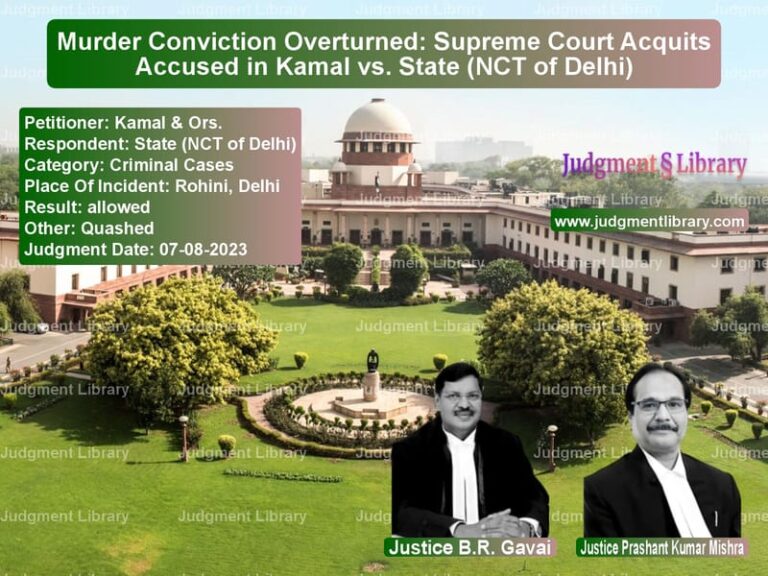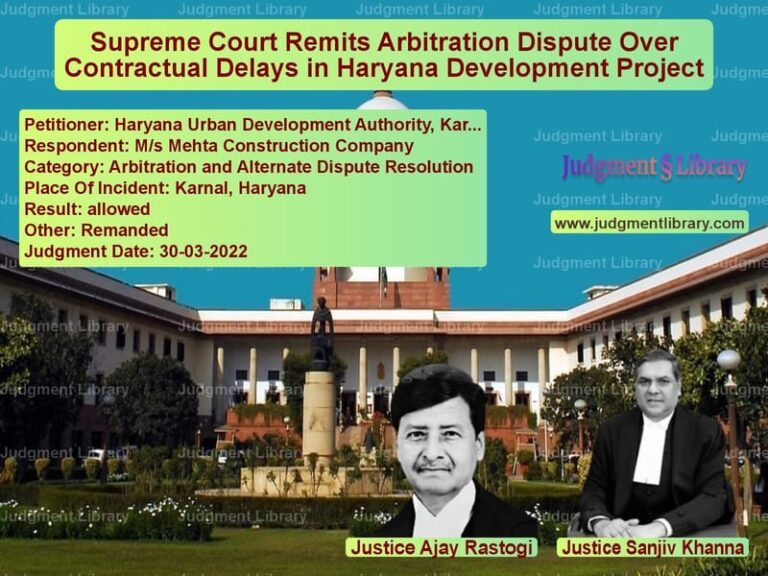False Allegations and Abuse of Process: Supreme Court Quashes Criminal Proceedings Against Widow
The case of Shafiya Khan @ Shakuntala Prajapati vs. State of U.P. & Anr. is a significant ruling in which the Supreme Court of India intervened to protect an individual from wrongful criminal prosecution. The judgment addresses issues of false allegations, abuse of legal provisions, and the mental trauma caused by frivolous litigation.
Background of the Case
The appellant, Shafiya Khan @ Shakuntala Prajapati, was born into a Hindu family and was married off as a minor in 2009 to Shiv Gobind Prajapati. However, the marriage was never consummated, and in 2014, it was dissolved through a village panchayat agreement between the families. Thereafter, Shiv Gobind Prajapati remarried another woman.
Shafiya Khan, believing her previous marriage to be annulled, later embraced Islam and married Mohd. Shameem Khan in December 2016 under Sharia law. Her new family, including the complainant (her brother-in-law), was aware and present during the marriage. The couple had a son in September 2017. However, tragedy struck when her husband passed away in December 2017.
Dispute Over Succession and Employment
After the death of her husband, Shafiya Khan obtained a succession certificate with no objections from her mother-in-law and received a compassionate appointment at King George Medical University, Lucknow, as an Auxiliary Nurse Midwife (A.N.M.). However, after some time, the complainant (her late husband’s brother) forced her out of her matrimonial home along with her 11-month-old child and began making allegations against her.
He filed complaints accusing her of:
- Forging marriage documents to gain employment.
- Harassing and mistreating her late husband’s family.
- Falsely claiming terminal benefits.
Following these complaints, a criminal case was filed against her in 2019 under various sections of the Indian Penal Code, including Sections 494, 495, 416, 420, 504, 506, 467, 468, and 471 IPC. She was granted anticipatory bail, but a chargesheet was filed, and she was summoned by the trial court.
Petitioner’s Arguments
Shafiya Khan approached the Allahabad High Court under Section 482 Cr.P.C. seeking the quashing of criminal proceedings, but the High Court refused to interfere. She then appealed to the Supreme Court, arguing that:
- The allegations were motivated by property and financial disputes.
- Her marriage with Mohd. Shameem Khan was legally valid and well-documented.
- She had never been accused of wrongdoing by her husband during his lifetime.
- The criminal case was an abuse of the legal system, initiated solely to harass her.
Respondents’ Arguments
The complainant (her brother-in-law) argued that:
- Her first marriage had not been legally annulled before her second marriage.
- She had forged documents to obtain government employment.
- She misused legal provisions to claim monetary benefits.
Supreme Court’s Ruling
The Supreme Court, after reviewing the evidence, concluded that the allegations were baseless and quashed the criminal proceedings against her. The Court ruled:
“The complaint does not contain any material evidence to support the allegations made by the respondent. If the criminal proceedings are allowed to continue, it would be nothing but a clear abuse of the process of law and a mental trauma to the appellant.”
The Court further observed:
“Although it is true that it was not open for the Court to embark upon any enquiry as to the reliability or genuineness of the allegations made in the FIR, there has to be some factual supporting material for what has been alleged in the FIR, which is completely missing in the present case.”
Key Directives from the Judgment
- The criminal proceedings initiated against the appellant based on FIR No. 0227 of 2019 dated July 9, 2019, were quashed.
- The Supreme Court set aside the Allahabad High Court’s order and protected the appellant from wrongful prosecution.
- The judgment reaffirmed that courts must not allow criminal cases to be used as tools for personal vendetta.
Significance of the Judgment
This ruling has several important implications:
- It reaffirms the legal protection against false criminal cases.
- It discourages the misuse of criminal proceedings for financial and property disputes.
- It emphasizes the role of courts in preventing the abuse of legal provisions.
- It protects widows and vulnerable women from being harassed using legal mechanisms.
Conclusion
The Supreme Court’s decision in Shafiya Khan @ Shakuntala Prajapati vs. State of U.P. & Anr. is a landmark ruling that protects individuals from malicious legal action. By quashing the wrongful FIR, the Court upheld the principle that criminal law should not be misused to settle personal scores. This case highlights the importance of a fair and just legal system that prevents the harassment of individuals through false accusations.
Petitioner Name: Shafiya Khan @ Shakuntala Prajapati.Respondent Name: State of U.P. & Anr..Judgment By: Justice Ajay Rastogi, Justice Abhay S. Oka.Place Of Incident: Uttar Pradesh.Judgment Date: 10-02-2022.
Don’t miss out on the full details! Download the complete judgment in PDF format below and gain valuable insights instantly!
Download Judgment: shafiya-khan-@-shaku-vs-state-of-u.p.-&-anr.-supreme-court-of-india-judgment-dated-10-02-2022.pdf
Directly Download Judgment: Directly download this Judgment
See all petitions in Bail and Anticipatory Bail
See all petitions in Judgment by Ajay Rastogi
See all petitions in Judgment by Abhay S. Oka
See all petitions in allowed
See all petitions in Quashed
See all petitions in supreme court of India judgments February 2022
See all petitions in 2022 judgments
See all posts in Criminal Cases Category
See all allowed petitions in Criminal Cases Category
See all Dismissed petitions in Criminal Cases Category
See all partially allowed petitions in Criminal Cases Category







